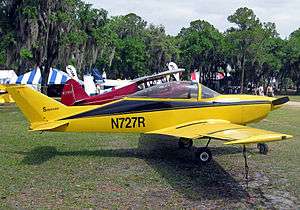Smyth Sidewinder
The Smyth Model S Sidewinder is an all-metal, two-seat side-by-side, low-wing homebuilt aircraft, designed and developed in the United States.[2] [3]
| Sidewinder | |
|---|---|
 | |
| 1976-built Sidewinder preserved at the Florida Air Museum at Lakeland Airport | |
| Role | Homebuilt aircraft |
| National origin | United States |
| Designer | Jerry Smyth |
| First flight | 21 February 1969[1] |
| Unit cost |
$3500 (1972) |
Design and development
In 1958 Jerry Smyth began the design of a monoplane sport aircraft, intended to be easy to build and fly as well as stressed to +9g for aerobatics. Construction of the prototype began in January 1967, taking two years to complete. Smyth's first component-built was a hand-carved wooden control stick grip which he said "he built the plane around".[4] Plans and kits for homebuilding were made available.[1]
Constructed of welded steel tubing with aluminum skinning, the Sidewinder has all-aluminum wings and is stressed to ±9g ultimate loading to allow aerobatics. Engines can be fitted with power ratings from 90 to 180 hp (67 to 134 kW) (some say 65-125hp)[3], weighing up to 310 lb (141 kg), enclosed in a fibreglass cowling. A sliding canopy covers the cockpit, the landing gear uses some landing gear components from the Wittman Tailwind and conventional controls are fitted but with an all-flying tailplane for pitch control. An unusual under-fuselage spoiler is used for approach control.,[5] The original design shared the same windscreen as a Thorp T-18.[6]
The prototype attended the 1969 Experimental Aircraft Association convention at Rockford, Illinois, winning the Outstanding Design Award.
Currently the rights to the Smyth Sidewinder are held by EU-Wish, which continues to market the design.[7] 290 sets of plans had been sold by 1972, with at least 46 examples registered and flying.[8]
Specifications Smyth Sidewinder
General characteristics
- Crew: one
- Capacity: one passenger
- Length: 19 ft 4 in (5.89 m)
- Wingspan: 24 ft 10 in (7.57 m)
- Height: 5 ft 5 in (1.65 m)
- Wing area: 96 sq ft (8.9 m2)
- Aspect ratio: 6.85
- Airfoil: NACA 64-612 - NACA 64-210
- Empty weight: 1,012 lb (459 kg)
- Max takeoff weight: 1,450 lb (658 kg)
- Fuel capacity: 17.5 Gallons
- Powerplant: 1 × Lycoming O-290 horizontally opposed piston aircraft engine, 125 hp (93 kW)
- Propellers: 2-bladed, 5 ft 7 in (1.70 m) diameter
Performance
- Maximum speed: 152 kn (175 mph, 282 km/h)
- Cruise speed: 140 kn (160 mph, 260 km/h) 75% power at 2,000ft (610m)
- Stall speed: 48 kn (55 mph, 89 km/h)
- Never exceed speed: 170 kn (200 mph, 320 km/h)
- Range: 369 nmi (425 mi, 684 km)
- Service ceiling: 15,000 ft (4,600 m)
- g limits: ±9
- Rate of climb: 900 ft/min (4.6 m/s) Sea level at 24°C
References
- Taylor, John W. R.. Jane's All the World's Aircraft 1982–83. Jane's Publishing Company. London. 1983. ISBN 0-7106-0748-2
- Air Trails: 78. Winter 1971. Missing or empty
|title=(help) - "Smyth Sidewinder," April 16, 2010 (Updated January 28, 2016), Plane and Pilot, retrieved November 23, 2019
- Air Progress: 48. November 1971. Missing or empty
|title=(help) - "Oshkosh Sport Aircraft Galore". Flight International. 22 August 1977.
- Popular Mechanics, John F Pearson and Howard Levy, August 1972
- Homebuilt Homepage Kits And Plans – EU-Wish
- Search for Aircraft by Model
External links
| Wikimedia Commons has media related to Smyth Sidewinder. |